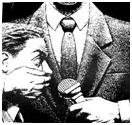 The Cuban Penal Code (CP) characterizes and punishes behavior that goes against the security of the state, the economy, public policy, etc. But in a different area of the law there is another criminal provision, which carries the same weight and promotes the same goals: Law No. 88, “Protection of National Independence and the Economy,” popularly known as “the Gag Law.”
The Cuban Penal Code (CP) characterizes and punishes behavior that goes against the security of the state, the economy, public policy, etc. But in a different area of the law there is another criminal provision, which carries the same weight and promotes the same goals: Law No. 88, “Protection of National Independence and the Economy,” popularly known as “the Gag Law.”
But these laws differ in the way their rules are drafted. Law 88 is more confusing and imprecise, which makes it hard to interpret. For example, the Penal Code prohibits conduct that goes against the legal order: public disturbance, incitement to crime, etc. In each of these sections the legislature made clear the factual situation that describes the crime:
“Anyone who . . . yells out an alarm, or utters warnings of a common danger . . .” (Public Disorders, Section 200.1 CP); “A person who provokes squabbling and bickering . . .” (Public Disorders, Section 201.1 CP); “A person who . . . publicly incites another to commit a particular offense . . .” (Incitement to Commit a Crime, Section 202.1 CP).
The character of places where the criminal activity occurs is also explicit: . . . “in public places, shows, or large gatherings . . .” (Public Disorders, Article 200.1 CP); “. . . in establishments open to the public, public transport vehicles, social circles, shows, family or public celebrations, or other events or places where many people gather . . .” (Public Disorders, Section 201.1 CP).
Article 8 of Law No. 88 (Part 1) sanctions “everyone . . . who intentionally disturbs the public order . . .” and “everyone . . . who promotes, organizes, or encourages disturbances to the public order referred to in the previous section” (Part 2).
Article 8 says nothing about the nature of the places where the conduct alleged to be socially dangerous occurs. Nor does it describe the possible acts that must occur to be considered disturbing the public peace. The offense is not defined.
The authorities may consider any action to be a disturbance of public order. This creates a climate of insecurity for citizens subject to the rule.
From this analysis we can derive a lesson and discover one of the strategies of the Cuban political class: drafting laws based on undefined and highly abstract fact patterns makes the interpretation and application of the Gag Law severe and leads to arbitrariness, supposedly in the public interest.
Translated by: Tomás A.
